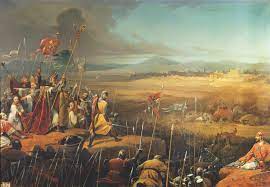Hildebert was born c.1055 to poor parents in Lavardin in central France. Intended for an ecclesiastical life, he was probably tutored at Tours, possible under Berengar of Tours. He became a master at the school of Le Mans, where possibly he crossed paths with Gallus Anonymus. Around 1096 or 1097 he became bishop of Le Mans, but was taken hostage by William II and carried to England for about a year as part of the frequent England-France conflict started by the 1066 Conquest.
Not all his clergy agreed with his management, and he went to Rome to ask Pope Paschal II if he could resign as bishop. Paschal refused. While he was in Rome, back in Le Mans trouble was brewing. A former Benedictine named Henry of Lausanne was in Le Mans preaching against church hierarchy. The people were attracted to his preaching and had admiration for his style: he went bare foot, slept on the ground, and lived on donations. Hildebert was able to force Henry out of Le Mans, but the population was still wary of church authority and willing to disregard it at will.
In 1125, against his will, Hildebert was made archbishop of Tours by Pope Honorius II. Now it was a French king he had to contend with: he and Louis VI clashed over ecclesiastical rights, a conflict Hildebert no doubt wished to avoid from all the way back when he asked to not be a bishop anymore.
He wrote, but he was given credit for many writings that were not his. Old editions of his writings ascribe to him things written by Peter Lombard and others. He was praised after his life for the work Tractatus theologicus, but this is now attributed to Hugh of St. Victor.
He was referred to as a saint by some writers, but there is no record of him being canonized. In fact, his familiarity with Latin classics like Cicero and Ovid give his writings a style more similar to pagan authors than Christian ones. The only two serious works that are still attributed to him are a life of Hugh of Cluny and of St. Radegunda. He was known for poems. The illustration shows a piece of a 12th-century edition of his poetry.
Hildbert remained archbishop of Tours until his death on 18 December 1133.
After he ejected Henry of Lausanne from Le Mans, Henry went elsewhere to preach. A different archbishop seized him and took him before the pope to deal with him. We'll see how that went tomorrow.








